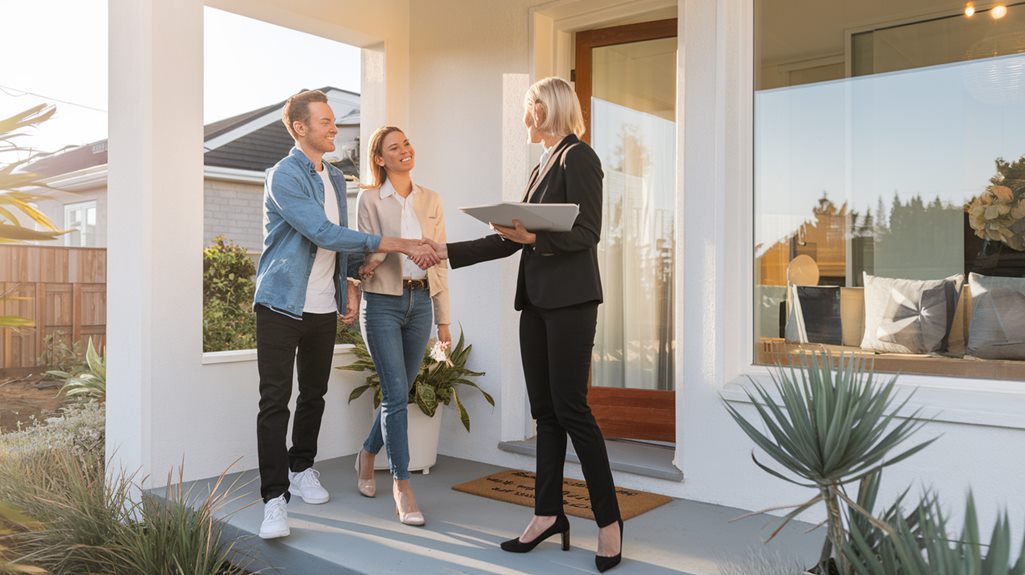You're about to start a fun journey to buy your first home! This guide will help you with 10 important steps.
First, look at your money to see how much you can spend. Getting pre-approved for a loan shows sellers you are serious.
Next, explore different areas to find a neighborhood that feels right for you. It's a good idea to find a helpful real estate agent who can assist you.
When you find a home you like, make a smart offer and plan a home inspection to check for any problems.
Then, get a mortgage with good terms and close the deal with confidence. Each step is important for buying your new home successfully!
Ready to start building equity in your own Michigan home? Get your personalized home loan quote today.
Assess Your Finances

Are you ready to buy your first house? Let's start by looking at your money. First, check your credit score. This number is important because it can change how much you pay for a loan. If your score is low, try paying off some debt to make it better.
Next, make a plan to save money. This will help you reach your goals. Don't forget to save some for emergencies, too! You can use simple budgeting tools to see where your money goes. This will help you find ways to save even more.
Think about how owning a home can help you in the future. Make sure it fits with what you want in life.
Michigan residents, unlock the door to your new home. Request your home loan quote from Treeside Financial today.
Determine Your Budget
Making a budget is a really important step when buying your first home. Start by looking at how much money you earn and how much you spend. This will help you see what you can afford.
Think carefully about what you can pay for a house. This will help you choose the right type of loan.
It's good to dream big, but it's even better to know what fits your wallet. Look into different loans to find one that works for you and your goals.
A clear budget helps you know how much you can spend and makes you stronger when buying a house.
Get Pre-Approved

Getting pre-approved is an important step when you want to buy a home. It shows sellers that you're serious and can be trusted.
To get pre-approved, you need to collect some important papers like your money records, tax forms, and credit details.
You might be closer to buying your home than you think
Take our 2-minute home buyer readiness quiz to see how prepared you really are – no credit check required.

When you get pre-approved, it helps you find a home faster and gives you a better chance in a busy market.
Importance of Pre-Approval
Before you start looking for a new home, it's really important to get a mortgage pre-approval. This is a big step that can make your home-buying journey much easier. When you have a pre-approval, sellers know you are serious about buying. It also helps you understand how much money you can spend.
Getting pre-approved has many good points. You find out how much you can borrow and learn about different types of loans that fit what you need. This helps you make strong offers on homes you like. It also makes you feel more connected to the community you want to join.
Here's how pre-approval can help you:
| Emotion | What it means |
|---|---|
| Confidence | You know how much money you can spend. |
| Security | You feel sure that you can buy a home. |
| Empowerment | You can make good offers on homes. |
| Peace of Mind | You understand your loan choices. |
| Belonging | You feel part of your future community. |
Getting pre-approved makes you stronger in your home search and brings you closer to getting your dream home.
Documents Needed for Pre-Approval
To start the pre-approval process, you need to gather some important papers that show your money situation.
First, get an ID like a driver's license or a passport to prove who you are. Lenders will also check your credit history, so make sure it's correct and up-to-date.
You'll need proof of your job, like recent pay stubs or a letter from your boss, to show you have a steady job. Your bank statements help lenders see how you manage your money and save.
Don't forget to bring your tax returns from the last two years; these help show if your income is steady.
Lastly, they'll look at your debt-to-income ratio to see how healthy your finances are.
Research Locations
When you're thinking about buying your first house, look at the neighborhood.
Check out the parks, stores, and fun places nearby. Also, see how good the local schools are.
These things can make a big difference in how happy you and your family will be. They can also help your house be worth more later.
Picking a place with nice things to do and good schools is a smart choice for you and your money.
Neighborhood Amenities Overview
How can you be sure you're picking the right neighborhood when buying your first house? Start by looking for fun places and activities that you enjoy.
Check out local events where you can meet new friends and feel like you belong. Safety is very important, so look at crime rates and see if there are neighborhood watch groups.
If you need to get to work or school, see how close public transportation is. Parks and playgrounds are great for staying active and healthy.
Make sure there are shops and restaurants that you like nearby. A neighborhood with these things makes life better and can help your home value grow.
School District Importance
When you're looking for a new home, don't forget about the local school district. Even if you don't have kids, good schools can make your home worth more money and help your neighborhood feel friendlier.
Schools that are well-liked show that people care about learning, and they can make your home easier to sell later. When schools do well, it often means the people in the community are involved and supportive. This helps everyone feel like they belong.
So, when you pick a place to live, look for areas with good schools. You're not just buying a house; you're also joining a lively and caring community.
Make sure to check out school ratings and local programs to find a spot that fits what you believe in and what you want for the future.
Hire a Real Estate Agent

Finding your way in the world of real estate can be tough. That's why it's a good idea to get help from a real estate agent. A good agent knows a lot about buying and selling homes. They can give you helpful advice and tell you what's happening in the market.
When you pick an agent, make sure they understand what you want. They will work hard to find homes that match what you are looking for and will fight for you during the buying process. This teamwork can make you feel more confident and less worried.
Here are some important things to think about when choosing an agent:
| Criteria | Importance Level | Description |
|---|---|---|
| Experience | High | Knows about the market and how it works |
| Communication | Medium | Gives clear and quick updates |
| Compatibility | High | Shares your goals and ideas |
When you trust a professional, you can focus on what really matters—finding a place that feels like home.
Start House Hunting
With a friendly real estate agent with you, you're ready to start looking for your new home!
First, check out online listings and use real estate apps to find houses that have what you really want. Make sure to look at local market trends so you know what houses you can afford.
When you go to open houses, bring a simple checklist to remember important things like how the house looks and its condition.
Virtual tours are a fun way to see homes from your couch, but don't forget to learn about the neighborhood too; it's important to know about the community where you might live.
Work with your agent to set a realistic timeline for your house search. Use smart house hunting tips to make everything easier.
Your dream home is out there, just waiting for you to find it!
Make an Offer

When you want to buy a house, you need to decide how much money to offer.
Make sure your offer is good for the market and your wallet. You should also ask for things that keep you safe, like checking the money, looking at the house, and making sure it's worth the price.
Don't be shy about talking with the seller. Sometimes, you can make a deal that works better for you!
Determine Offer Price
Deciding how much to offer when buying a home is very important. It can really change how much you have to spend. To make sure your offer is good, start by looking at what other homes like it have sold for in your area. This will help you see what's a fair price for the home you want.
Here are some things to think about when you choose your offer price:
- Market conditions: Are there more buyers than homes (a buyer's market) or more homes than buyers (a seller's market)?
- Property condition: Is the home in good shape or does it need some work compared to others?
- Seller's motivation: Does the seller want to sell quickly?
Thinking about these things will help you make a smart offer!
Include Contingencies
Making your offer with contingencies is a smart move that helps you as a buyer. Contingencies are special conditions that need to be met before you finish buying a home. Some common ones are financing, appraisal, and inspection.
A financing contingency helps you if your loan doesn't get approved. An appraisal contingency makes sure the home is worth what you're paying. An inspection contingency lets you check for big repairs before you say yes to the house.
Using these protections gives you confidence in buying a home that's right for you. Think of contingencies as your helpers in the negotiation process, making you feel welcome in your new neighborhood.
Negotiate Terms
Negotiating is like a game that helps you get the home you really want. To win, you need to know how to talk and make deals.
First, think about what the seller wants. Do they need to sell fast, or do they want the most money? Make your offer fit what they need while also being good for you.
Here are some easy ideas to help you:
- Research the Market: Learn how much the house is worth and what similar houses sold for. This helps you explain why your offer is fair.
- Be Flexible: If you can change things like the closing date or other conditions, it might make your offer more attractive to the seller.
- Show Your Strengths: Let the seller know you're ready to buy. Tell them you have your finances in order and a pre-approval letter.
When you join a group of smart buyers, you can learn these skills.
With some practice and smart planning, you can get the best deal on your new home!
Schedule a Home Inspection
Before you buy a new home, it's important to make sure it's in good shape. The best way to do this is by getting a home inspection. This helps protect your money and helps you become a smart homeowner.
Start by making a list of things to check in the house. This way, you won't miss anything, from the roof all the way down to the basement.
It's also important to hire someone who knows what they're doing. A good inspector can find problems that you mightn't see right away. Ask your friends or a real estate agent to help you find a good inspector.
Try to go to the inspection yourself. Watching the inspector look around gives you a better idea of how the house is. This knowledge helps you make smart choices and feel good about your new home!
Secure Your Mortgage

After you check that your future home is in good shape, the next thing to do is get your mortgage.
It's important to know about different types of mortgages and interest rates. You can choose a fixed rate, which stays the same, or an adjustable rate, which might be lower at first but can change later. Your credit score will affect the interest rates and loan options you can get.
Here are some things to think about:
- Down Payment: Think about how much money you can put down. This will change how much you pay each month and if you need mortgage insurance.
- Lender Options: Look at offers from different lenders. This helps you find the best rates that fit what you need.
- Closing Costs: Don't forget to include these extra costs in your budget.
Getting a mortgage is a big step toward owning your own home and being part of your community.
Close the Deal
Once you get your mortgage, it's time to close the deal and make that house your home!
First, schedule a final walkthrough. This is your chance to check that everything is as it should be and that any repairs are done. You want to make sure you're happy before you sign the papers.
Next, think about closing costs. These are fees you have to pay for the loan, the appraisal, and title insurance. They can add up, so make sure you have enough money set aside for these costs.
When you go to the closing meeting, look over all the papers carefully. If you don't understand something, ask questions! It's important to know what you're signing.








